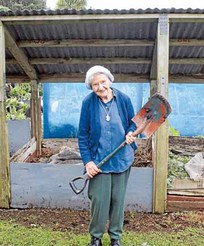 Sister Loyala
Sister Loyala By Linda Gordon
IT’S true gardeners have had an image problem in the past. Decent people, mostly middle aged and older, hopelessly unfashionable: baggy trousers stained at the knees, cardigans over jumpers and shapeless tee shirts, troubling hats or hair blown every which way.
IT’S true gardeners have had an image problem in the past. Decent people, mostly middle aged and older, hopelessly unfashionable: baggy trousers stained at the knees, cardigans over jumpers and shapeless tee shirts, troubling hats or hair blown every which way.
Yet strangely, in a world hungry for novelty and heroes from anywhere, comes a gardener in a funny hat and a cardigan to captivate an international audience.
Sister Loyola Galvin, 90-something, is the sprightly star of a documentary called Gardening with Soul, from New Zealand filmmaker Jess Feast.
The reviews have been good, and me and my gardening mates will definitely be among the audience at this week’s Wonthaggi screenings. (We will take our hats off.)
Sister Loyola is no ordinary gardener despite her tell-tale lack of fashion sense. She is a nun who has devoted her long adult life to service, and the garden.
As she tells it, her garden reminds her constantly that life is evolving. Gardens can teach us forbearance in the face of the inevitable, she believes.
Spirituality does grow in gardens. Think of the Findhorn spiritual community in north east Scotland, on the shores of the Moray Firth. It is now a foundation, has a college, is recognised by the UN, and houses hundreds of residents and visitors in an ecovillage. But gardening remains the community’s heart and soul.
There, about 50 years ago, three spiritually attuned non-gardeners obeyed the call and started a food garden in a caravan park on barren ground.
Myth, faith, compost, the impact of the Gulf Stream? Who knows. But within a short time people came to marvel at Findhorn’s gardens, with their giant cabbages and incredible fecundity.
Findhorn’s pioneers said they simply listened to and took instruction from the plant world, starting with the peas.
Sister Loyola would understand, I feel sure.
What I am looking forward to witnessing is Sister Loyola’s clear sighted embrace of life. And, of course, her composting technique.
Gardening with Soul is showing in Wonthaggi until July 30. See Wonthaggi Cinema for times.
Books about the Findhorn Garden story are available from the West Gippsland Regional Library or visit Findhorn Foundation.
Sister Loyola Galvin, 90-something, is the sprightly star of a documentary called Gardening with Soul, from New Zealand filmmaker Jess Feast.
The reviews have been good, and me and my gardening mates will definitely be among the audience at this week’s Wonthaggi screenings. (We will take our hats off.)
Sister Loyola is no ordinary gardener despite her tell-tale lack of fashion sense. She is a nun who has devoted her long adult life to service, and the garden.
As she tells it, her garden reminds her constantly that life is evolving. Gardens can teach us forbearance in the face of the inevitable, she believes.
Spirituality does grow in gardens. Think of the Findhorn spiritual community in north east Scotland, on the shores of the Moray Firth. It is now a foundation, has a college, is recognised by the UN, and houses hundreds of residents and visitors in an ecovillage. But gardening remains the community’s heart and soul.
There, about 50 years ago, three spiritually attuned non-gardeners obeyed the call and started a food garden in a caravan park on barren ground.
Myth, faith, compost, the impact of the Gulf Stream? Who knows. But within a short time people came to marvel at Findhorn’s gardens, with their giant cabbages and incredible fecundity.
Findhorn’s pioneers said they simply listened to and took instruction from the plant world, starting with the peas.
Sister Loyola would understand, I feel sure.
What I am looking forward to witnessing is Sister Loyola’s clear sighted embrace of life. And, of course, her composting technique.
Gardening with Soul is showing in Wonthaggi until July 30. See Wonthaggi Cinema for times.
Books about the Findhorn Garden story are available from the West Gippsland Regional Library or visit Findhorn Foundation.